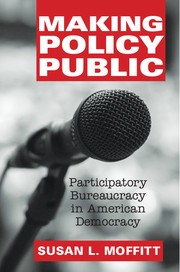Book contents
- Frontmatter
- Dedication
- Contents
- List of Figures
- List of Tables
- Preface
- Abbreviations
- 1 Portals of Democracy in American Bureaucracy
- 2 Participatory Bureaucracy in Practice
- 3 The Development of Public Committees
- 4 Making Educational Performance Public
- 5 Private Knowledge for Public Problems
- 6 Setting the Public Agenda
- 7 Deliberate Participation
- 8 The Impact of Public Advice
- 9 Participatory Bureaucracy in American Democracy
- Appendix
- Bibliography
- Index
- References
1 - Portals of Democracy in American Bureaucracy
Published online by Cambridge University Press: 05 October 2014
- Frontmatter
- Dedication
- Contents
- List of Figures
- List of Tables
- Preface
- Abbreviations
- 1 Portals of Democracy in American Bureaucracy
- 2 Participatory Bureaucracy in Practice
- 3 The Development of Public Committees
- 4 Making Educational Performance Public
- 5 Private Knowledge for Public Problems
- 6 Setting the Public Agenda
- 7 Deliberate Participation
- 8 The Impact of Public Advice
- 9 Participatory Bureaucracy in American Democracy
- Appendix
- Bibliography
- Index
- References
Summary
“[K]nowledge is no longer an immobile solid; it has been liquefied; it is actively moving in all the currents of society itself.”
John Dewey“Advisory committees can be of great value. They contribute to the “openness” of Governmental decision-making, and provide advice and information not otherwise available to the Government. Their functions range from providing policy advice on major national issues, to providing technical recommendations on particular problems.”
Federal Advisory Committees: Sixth Annual Report of the President, 1978“Imagine planning your day around your life, instead of your osteoarthritis pain,” enticed Merck’s advertising campaign for Vioxx, its blockbuster arthritis drug. The drug Merck promoted “for everyday victories” soon became a symbol of regulatory failure as evidence emerged linking Vioxx with serious cardiovascular side effects and deaths. At the beginning of Senate hearings convened in 2004 to investigate Vioxx’s withdrawal from the market, Senator Charles Grassley (R-IA) alleged that the FDA had “allowed itself to be manipulated by Merck” and, more broadly, that “the FDA has a relationship with drug companies that is far too cozy.” The remedy for coziness with industry and for regulatory failure, Senator Grassley continued, would include “changes inside the FDA that [would] result in greater transparency and greater openness.” In its 2007 review of American drug safety, the Institute of Medicine (IOM) similarly claimed, “the FDA’s reputation has been hurt by a perceived lack of transparency and accountability to the public.” As part of its package of proposals to improve the agency’s impaired reputation, the Institute of Medicine called on the FDA to make greater use of its public advisory committees – groups of nongovernmental medical practitioners, researchers, and stakeholder representatives that the FDA consults on matters such as drug approval and labeling – to supplement agency expertise and to enhance transparency in the drug approval process. These proposals suggested public engagement could render FDA decisions both more accountable and less prone to regulatory failure.
- Type
- Chapter
- Information
- Making Policy PublicParticipatory Bureaucracy in American Democracy, pp. 1 - 27Publisher: Cambridge University PressPrint publication year: 2014



